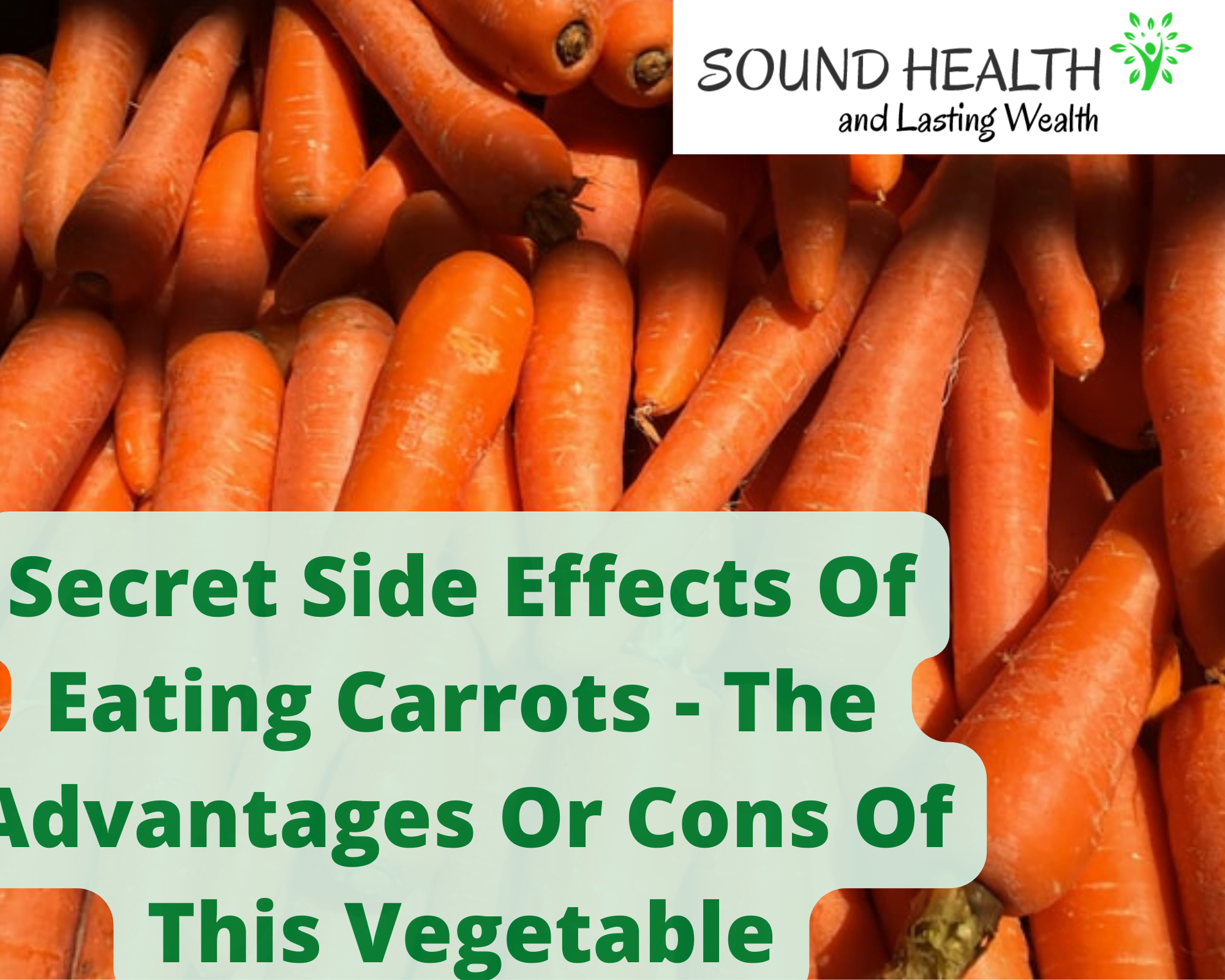We will be discussing in detail the “Secret Side Effects Of Eating Carrots” in this article but first, let’s understand the importance of incorporating carrots in our food.
Carrots are a great vegetable to include in our diet because they’re packed with benefits and a great source of nutrients. Asides from being a rich source of beta-carotene which is credited for the plant’s characteristic orange hue, carrots are also high in vitamin C which promotes a healthy immune system, teeth, nails, hair and reduces bruising.
However, while we’re eating them, it is important to know they have other “secret” side effects that might not be as obvious. Without further ado, let’s take a look at the Secret side effects of eating carrots.
Carotenemia
Carotenemia is a condition that occurs when there is an excess of beta-carotene in the blood in the blood. This carotene comes from plants and is found in foods such as carrots, sweet potatoes, and squash.
If someone eats too many carotene-rich foods, the carotene can build up in the bloodstream and cause the skin to turn yellow or orange. It is more common in infants and young children because they eat more fruits and vegetables than adults do. Carotenemia can also be caused by taking certain supplements or medications.
It is usually harmless and does not require treatment. However, in some rare cases, it can be a sign of a more serious condition such as liver disease. If you notice that your skin has turned yellow or orange, you should see a doctor rule out any underlying conditions.
Also Read: 10 Side Effects of Eating Rice Cakes – Disadvantages Or Cons To Know
Could Cause Bowel Changes
Carrots are a good source of dietary fiber, which is important for bowel regularity. However, carrots also contain a type of soluble fiber called pectin. Pectin can increase stool bulk and softness, which may cause more frequent bowel movements or diarrhea in some people. If you experience these side effects after eating carrots, try reducing your intake or cooking the carrots to make them easier to digest.
Overall, Carrots are good source of vitamins and minerals, so they can be a healthy addition to your diet. Just be sure to eat them in moderation to avoid any unwanted bowel changes.

May Change Breast Milk Colour/ Flavor
Carrots are known to contain a high amount of beta-carotene. This substance can actually cause your breast milk to change color to orange and alter the flavor. While there’s no evidence that breast milk color change or flavor can be harmful, to babies, it can be quite off-putting for some mothers. If you’re breastfeeding and eating carrots, it’s best to avoid letting your baby drink the milk directly after a meal. Wait at least an hour or two before nursing to give the beta-carotene time to dissipate.
Allergy
Carrots are a common allergen for many people. The allergy is caused by a protein in the carrot that is similar to a protein in pollen. When someone with a carrot allergy eats carrots, their body reacts as if they are being invaded by pollen. This can cause symptoms like itching, swelling, and difficulty breathing.
Some Benefits Carrots
May Keep Diabetes Risk Low – It’s been said that carrots can help lower your risk of developing diabetes. One of the reasons why this may be true is because carrots contain a type of soluble fiber known as pectin. Pectin has been shown to help regulate blood sugar levels by slowing down the absorption of glucose into the bloodstream. Carrots also contain a compound called alpha-carotene, which is converted into vitamin A in the body. Vitamin A has been linked to improved insulin sensitivity, meaning it can help keep blood sugar levels in check. So if you’re looking for ways to help prevent diabetes, adding some carrots to your diet may be a good place to start.
Prevents Cancer – Carrots contain many nutrients that are beneficial to our health. One of these nutrients is beta-carotene, which is converted into vitamin A in our bodies. Vitamin A is important for maintaining healthy vision and skin. It can also help to prevent cancer. Research has shown that people who eat foods containing beta-carotene are less likely to develop lung cancer and other types of cancer.
May Help With Heart Disease – Carrots contain a lot of fiber, which helps to remove cholesterol from the body. They also contain beta-carotene, which is converted into vitamin A in the body. Vitamin A helps to keep the lining of the heart healthy. It also prevents atherosclerosis, which is the hardening of the arteries.
Key Vitamins In Carrots
Vitamin A – Carrots are a good source of Vitamin A. Vitamin A is important for vision or eyes, skin health, and immune function. It can also be helpful in preventing cancer. carrots get their orange color from carotenoids, which are compounds that can be converted to vitamin A in the body.
Vitamin B – Carrots contain a good amount of vitamin B. This vitamin is important for the metabolism of carbohydrates and fats. It also helps the body to use proteins efficiently. Vitamin B is found in many foods, but carrots are a good source of this nutrient.
Vitamin C – Carrots contain vitamin C, which helps your body create antibodies to protect your immune system. Additionally, vitamin C helps your body absorb and utilize iron while warding off infections. They can aid in constipation relief. Eat some raw carrots if you’re having trouble going to the bathroom.
Vitamin D – is an essential nutrient that helps the body absorb calcium and phosphorus. It is also necessary for proper immune system function. Carrots are a good source of vitamin D, providing about 10% of the daily recommended value in a single cup.
Vitamin E (alpha-tocopherol) – Carrots are a good source of vitamin E. Vitamin E is a nutrient that helps keep your skin healthy. It also helps protect your cells from damage. One serving (0.84 mg) of carrots has 6 percent of your daily value for vitamin E, as well as other nutrients.
Vitamin K – Carrots are a good source of vitamin K. Which is important for blood clotting, bone health and can prevent heart disease. It is found in dark green leafy vegetables, broccoli, Brussels sprouts, cabbage, and soybeans.
FAQs
Does carrot have vitamin B12
Carrots do not have vitamin B12. Vitamin B12 is found in animal products such as meat, poultry, fish, eggs, and dairy. It is also found in fortified foods such as cereals and some plant-based milks. If you are following a vegan diet, you should take a supplement or eat foods that are fortified with vitamin B12.
Also read: Side Effects Of Eating Cucumber At Night – Disadvantages Or Cons To Know








